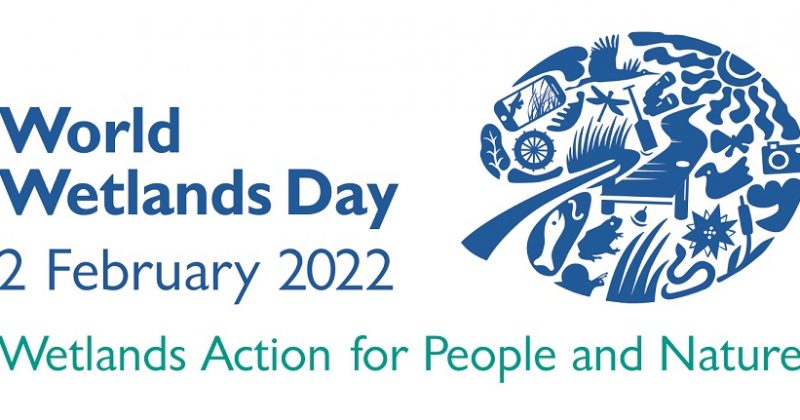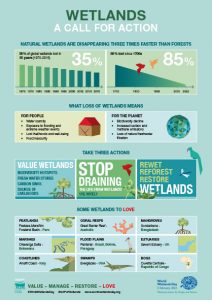Susan O'Rourke | January 10, 2022

On February 2nd, join UNC World View in celebrating World Wetlands Day. This day marks the critical role wetlands play around the world, and this year’s theme “Wetlands Action for People and Nature,” aims to motivate individuals, businesses, and governments to “invest financial, human and political capital to save the world’s wetlands from disappearing and to restore those we have degraded.”
World Wetlands Day began with the adoption of the Convention on Wetlands by members of the United Nations meeting in 1971 in Ramsar, Iran. The convention defines the diverse habitats that constitute wetlands, from marshes to mangroves and peatlands to oases; affirms their importance to wildlife, particularly waterfowl, and water purification; and calls signing nations to increase efforts to protect wetlands from the effects of climate change and land use. Wetlands International emphasizes, too, that wetlands are a crucial part of human life as they “are often the engines of local economies,” provide “plentiful food,” offer “protection from disasters,” and actually help humans fight climate change by serving as some of “the earth’s top carbon stores.”
World Wetlands Day provides a great opportunity to bring a global perspective to discussions of environmental science, history, international politics, and economics. Consider the following activities to get your students energized about this ecosystem!
- Wetlands Tour: Set up stations based on types of wetlands or continents for students to learn more about wetland diversity across the globe.
- World Wetlands Day Action Page: Browse the “Actions For Wetlands” posted by individuals around the world on the World Wetlands Day site. Invite students to identify types of actions people are taking to learn about, advocate for, or protect wetlands in their home countries and/or globally. Brainstorm actions that students can take here in NC.
- Invite students to research economic industries dependent upon wetlands.
- For a hands-on activity, invite students to create a “Wetland in a Pan.”
- Participate in “The Watershed Sleuth Challenge” from the National Environmental Education Foundation.
We hope you’ll get your students’ feet wet in the study of wetlands and that you’ll join us on April 7, 2022, for our K-12 & Community College virtual program, Understanding Climate Change!
Teaching Materials:
- The Wetlands Reading List (Pre-K- Grade12) (EPA)
- Ten of Our Favourite Children’s Books and Stories Featuring Wetlands (Wildfowl & Wetlands Trust)
- Wetlands Education for Students and Teachers (activities, teaching guides, videos, and more) (EPA)
- Wetland in a Pan (Penn State University)
- Wetlands Curriculum Unit (Grades 9-12) (NASA)
- The Watershed Sleuth Challenge (National Environmental Education Foundation)
- Hands on the Land Educator Toolkit (Navigate to “Wetland Field Work Activities” in the linked PDF) (National Environmental Education Foundation)
- Wetlands Fun and Learning (lesson plans, games, creative activities, quizzes) (Wildfowl & Wetlands Trust)
- Discovering Wetlands in Australia
- Curriculum Connection (teaching materials on NC Wetlands) (NC Wetlands)
Overview of Wetlands:
- World Wetlands Day (Ramsar Convention/ The Convention on Wetlands)
- World Wetlands Day 2022 (International Coral Reef Initiative)
- Wetlands (EPA)
- Why Wetlands Matter (Wetlands International)
- (Types of) Wetlands (National Geographic Encyclopedia)
- Types of Wetlands (Wetlands International)
- Map of the Month: Where are the World’s Wetlands (Resource Watch)
- Wetlands of the United States (National Environmental Education Foundation)
- NC Wetlands
- NC Wetlands Passport (NC Wetlands)
- Common Wetland Plants Guide (NC Wetlands)
- A Quilombola Woman Recounts How The Wetlands Help Sustain Her Community (Wetlands International)
Sample Country-Specific Resources:
- A First Directory of Ethiopian Wetlands
- Wetlands in Northeastern Russia
- Celebrating Australia’s Wetlands: A Showcase of Australian Ramsar Sites
- Lowland Wetland (Scotland)
- About Coastal Wetlands (United States)
- Panama Bay Wetlands: Case Study of a Threatened Ecosystem
The Convention on Wetlands
- Introducing the Convention (The Ramsar Convention/The Convention on Wetlands)
- Copy of the Original Convention (The Ramsar Convention/The Convention on Wetlands)
- Copy of the Updated Convention (The Ramsar Convention/The Convention on Wetlands)
